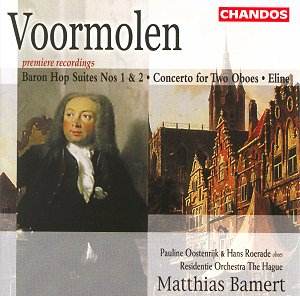Alexander VOORMOLEN (1895 -
1980)
Baron Hop Suite No. 1 (1924) [16.23]
Concerto for two Oboes & Orchestra * (1933)
[21.43]
Eline, Nocturne for Orchestra (1951) [11.19]
Baron Hop Suite no. 2 (1931)
[21.47]
 Residentie Orchestra, The
Hague conducted by Matthias Bamert
Residentie Orchestra, The
Hague conducted by Matthias Bamert
* with Pauline Oostenrijk & Hans Roerade (oboe)
Recorded May, 1999
 Chandos CHAN 9815
[71.44]
Chandos CHAN 9815
[71.44]
Crotchet

The name of Alexander Voormolen will be new to many listeners as it was to
me. Born in Rotterdam, he studied music initially in his native country but
around 1917 he went to Paris where he became a pupil of Albert Roussel. He
also met Ravel who, although he did not teach the young Dutchman, took an
active interest in his career. Returning to Holland in 1920 Voormolen then
remained an active figure in Dutch musical life as a composer and conductor
until his death.
The music on this excellent CD, all of which is recorded for the first time,
is consistently engaging and well crafted. The two suites, which sound to
be scored for a large orchestra, are named after a prominent figure in late
eighteenth century Dutch life. The music was originally intended for an
opéra-comique celebrating life in The Hague in Hop's lifetime
but the project was never completed. The suites are neo-classical in style.
However, the author of the sympathetic notes points out, rightly, that Voomolen's
version of neo-classicism is closer to that of Richard Strauss than to that
of Stravinsky. The music, which is dispatched with relish, is attractive,
very tuneful and is colourfully orchestrated.
The same description fits the Concerto for Two Oboes. I would think it is
great fun to play and the soloists on this disc, both of whom are principals
with the Residentie Orchestra, certainly sound as if they are enjoying
themselves. They are attentively accompanied by their colleagues under Bamert's
expert direction.
The remaining item on the disc is the Nocturne, Eline. This is a later
work, originally written for piano and later orchestrated. The tone of this
piece is more serious, darker even, but it is still most enjoyable to listen
to. Like the other pieces in the programme it is played with commitment and
conviction.
The recorded sound is in the usual full-blooded Chandos tradition.
A most interesting disc of unfamiliar repertory which is well worth exploring
John Quinn
See also review by John Phillips

